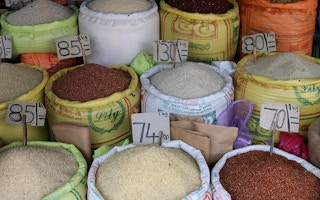Purple rice from the Himalayas, hairless apricots from Kyrgyzstan and black amaranth grains from the Andes are just some of the foods to be labelled mountain products under a scheme to help boost incomes of farmers in these remote regions.
The custodians of most of the world’s freshwater and a unique biodiversity are under pressure from growing hunger, climate change and marginalisation by governments, the U.N. Food and Agriculture Organisation (FAO) said.
FAO’s Mountain Partnership Product label is a small step in helping them improve their lot, and preserve their centuries-old traditions, the U.N. agency said.
“Most mountain products are very high quality, they are niche products,” said Rosalaura Romeo, programme officer for FAO’s Mountain Partnership, which comprises more than 250 members including governments and charities.
“
The label is a contribution - it will not solve all the problems of the mountain people, but it will help (them) sell their products, continue their activities and to get a decent price for their work.
Rosalaura Romeo, programme officer, FAO’s Mountain Partnership
“We want to ensure they are able to sell them at a decent price,” she told the Thomson Reuters Foundation.
Costly middlemen transport crops down from the mountains, and by the time they reach the markets they have often been mixed up with similar but lower-quality produce grown in lowland areas, and sold for the same price, she said.
Mountain farmers may get just 10 percent of the market price, compared with the 50 per cent or more that lowland farmers receive, Romeo said.
The label is part of a wider scheme by the Mountain Partnership to help farmers, which includes working with retailers to get a better price for their products.
It is also exploring ways to reduce the number of middlemen for some products.
Poverty
More than 900 million people live in mountain areas, home to some 70 per cent of the world’s freshwater supplies and 25 per cent of the planet’s biodiversity, according to the Mountain Partnership.
Many of them belong to indigenous communities and lack the rights and access to schools and hospitals that people living in the lowlands enjoy, said Romeo.
The number of people susceptible to hunger in the mountainous regions of developing countries has risen 30 per cent since 2000, and now affects one in three people in these areas, according to FAO.
Many men move in search of work, leaving women behind to tend the land.
Changes in the climate, bringing warmer weather, has been a mixed blessing. In the short-term, it allows some communities to farm more higher up and to raise cattle.
But it has also brought more dangers from landslides, floods, avalanches, erratic water supplies and new plant and animal pests, the Mountain Partnership said.
“Mountain communities around the world are facing the same problems … migration, poverty, empty villages,” Romeo said.
“The label is a contribution - it will not solve all the problems of the mountain people, but it will help (them) sell their products, continue their activities and to get a decent price for their work,” she said.
The label, which will be rolled out in the next few weeks, has been developed with Slow Food, an international grassroots movement that seeks to improve the lives of farmers.
FAO will issue the labels for free to small-scale farmers or farmers’ associations who can prove their produce is only found in the mountains and has low environmental impact.
The idea is based in part on national parks in Europe and north America which have developed labels for their products.
The scheme will not replace formal certification schemes like Fairtrade which also aims to improve the lives and working conditions of farmers.
This story was published with permission from Thomson Reuters Foundation, the charitable arm of Thomson Reuters, that covers humanitarian news, women’s rights, trafficking, corruption and climate change. Visit http://news.trust.org










